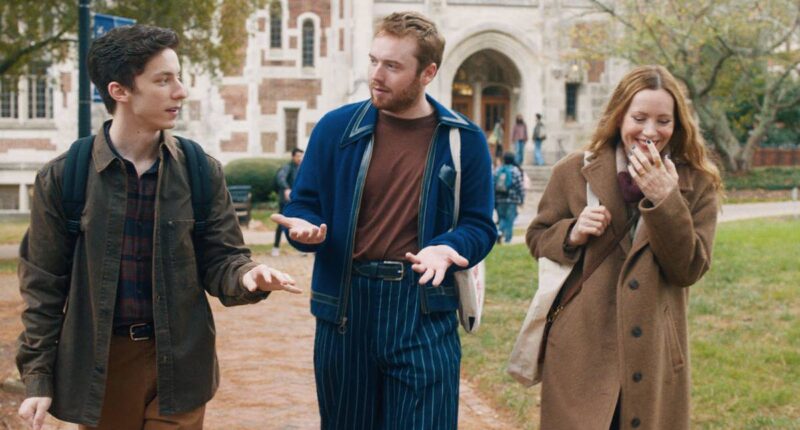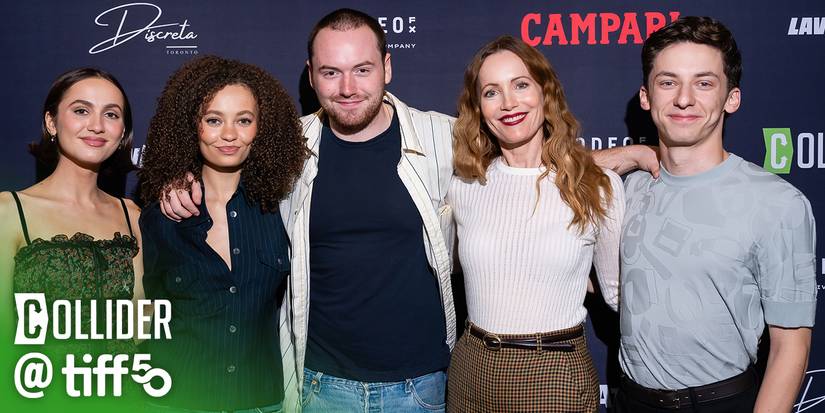Between Materialists, Oh, Hi!, and a few streaming titles that felt more like algorithm snacks than actual meals, it’s been a drought for rom-coms over the past few years. The genre has seen flickers of life with a few titles here and there, but that Nora Ephron sweet spot, where banter carries real feelings and the jokes never undercut its humanity, is largely missing. Which brings us to Maude Apatow, who is making the genre all her own with her easy-to-love directorial debut, Poetic License. Following its world premiere at the Toronto International Film Festival, Apatow delivers an ambitious and refreshingly intellectual rom-com that feels like a return to form as it spins the genre for a new generation. Truly one of the best romantic comedies of the year, it’s proof that the genre still hits when someone this sharp and self-aware is behind the camera.
As a film that announces a new voice in the dramedy realm with confidence, wit, and genuine heart, the daughter of Judd Apatow and Leslie Mann proves she’s more than a famous last name. Creating a voice unique to her own style, Poetic License radiates a sense of warmth and longing from its very first scenes with an aesthetic that makes you want to curl up inside its world and live there. While Apatow leans into a soft Ephron-esque tenderness, she refracts that nuance through the lens of a generation raised on Instagram and TikTok for a story that is charmingly lived-in, emotionally thoughtful, and a sincere delight with whip-smart dialogue that surprises as often as it comforts.
‘Poetic License’ Calls Back to Classic Rom-Coms
At the heart of Poetic License is Apatow’s equally talented mother, Mann, playing Liz — a former therapist who has just uprooted her life in Chicago to follow her husband James (Cliff “Method Man” Smith) to a small, sleepy college town on the East Coast. While their teenage daughter Dora (Nico Parker) is one year away from leaving for college, Liz feels the burn of her husband and daughter’s respective plans without her and is suddenly staring down the reality of being an empty nester. In an effort to stay busy amid the family’s new reality, she signs up to audit a poetry class at the college her husband teaches.
This is where she meets Ari (Cooper Hoffman) and Sam (Andrew Barth Feldman), best friends who couldn’t be more different. Ari is rich, reckless, and always talking (with his therapist even hinting he might be a grandiose narcissist), while Sam is the tightly wound econ major with a long-term girlfriend (Maisy Stella), juggling RA duties and quietly stressing about his soul as he preps for a Wall Street internship. The pair has been inseparable since freshman year and are bonded by a friendship refreshingly free of toxic masculinity while genuinely supporting each other’s passions.
But Liz’s presence shakes something loose between them. Both young men quickly become drawn to her after she “sees” them following a poem she writes during an exercise in their class. While their reactions never border on creepy, it’s indicative of just how badly they want to be seen or feel special while holding onto their friendship as adulthood looms. For Liz, that attention from the pair fills a hole in her life she didn’t even realize was there between late nights of banter, a mushroom-fueled party filled with insecurities, and an emotional push-pull dynamic that complicates not only Ari and Sam’s friendship, but also her connection with Dora.
‘Poetic License’ Is Equal Parts Funny and Heartfelt
While Poetic License appears as a romantic comedy of errors on the surface, its brilliance lies in its compelling balance of drama and tone. Apatow’s smart pacing and direction alongside Raffi Donatich’s script ensure the film never tries too hard. Instead, its heart and humor come from awkward silences, tossed-off one-liners, and the absurdities of getting older. The writing is sharp and never showy as quips fly when they need to, like a throwaway joke about the college’s new “cryptocurrency department” or Ari confusing Sam’s Morgan Stanley internship with “Tracy Morgan.”
But Donatich also sneaks in some quiet, more emotional beats that sting like Liz silently sorting through her daughter’s baby clothes in a wordless moment of heartbreak. It’s that balance of wit and poignancy that makes the script pop. Each moment has a warmth to it because it comes from the character, and not some lazy setup. For example, the scenes at Ari’s apartment where he attempts to seduce Liz stretch just long enough to let the awkwardness blossom into hilarity before becoming a portrait of mutual honesty.
Like her father’s movies, it runs a touch longer than most comedies, clocking in almost two hours, but that’s part of the charm. These characters — even the eccentric poetry teacher Greta (Martha Kelly), constantly updating the class about her divorce (and losing the cat and air fryer) — are so well drawn that you want to sit with them through moments that create additional layers. The film breathes, and that breathing room is exactly why it works. But one of the best and most beloved appeals of `oetic License is the autumnal coziness filled with crunchy leaves, warm lamplights, and oversized sweaters that would make even Sally Albright envious. None of it is just window dressing that pays spirited homage to Ephron, but it sets a mood that reinforces themes of change and transition, humming under every scene.
‘Poetic License’ Boasts an Ensemble With Perfect Chemistry
For all of Apatow’s skills behind the camera, Poetic License works so well because the cast is not only perfectly attuned to the film’s rhythms, but everyone has impeccable chemistry with one another. Mann is magnetic as she finally gets a leading role that lets her shine in full complexity. Liz could’ve easily fallen into the “restless mom” stereotype, but the actress makes her heartbreakingly human and vulnerable. Her longing is never about having an affair, but the validation and fun she’s been starved of, and she nails every beat, from goofy drunken laughs to quiet moments of yearning.
Balancing Mann’s performance is the captivating duo of Hoffman and Feldman. Hoffman is electrifying and extraordinary to watch. While the shadow of his late father, Philip Seymour Hoffman, is impossible to ignore, he isn’t imitating anyone. Instead, he brings his own subtle magnificence to Ari, with bravado and quips masking deep insecurity. There’s a tenderness beneath Ari’s expensive cardigans that makes him magnetic, the kind of ache you can’t look away from. On the other hand, Feldman is his perfect foil: disciplined, simmering, and quietly intense. He’s a raw talent that truly keeps you engaged in every scene. But it’s interesting to see how Feldman plays Sam’s insecurity through sharp expressions, which often betray more than his words. Together, the pair embody a friendship on the brink — inseparable yet combustible — and Apatow captures every shift with authenticity.
But the film’s emotional texture and generational scope are enriched by an absolutely absorbing Nico Parker, who plays Liz’s daughter to perfection. She is grounded and layered with believable frustrations of a teenager eager for independence while tethered to her mother. The scenes Parker and Mann share are some of the most poignant in the film, making you wonder how they parallel the dynamics betweeb Mann and Maude Apatow. Even the film’s smaller roles pop in surprising ways, like Stella, who has limited screen time as Sam’s girlfriend but makes an impression with a mix of sweetness and subtle frustration. Martha Kelly, as the poetry professor, is simply inspired, casting as she elevates every scene she’s in with deadpan musings about her toxic divorce. Even Smith, in his role as Liz’s husband, adds a soft warmth and humor, creating a character who resides on the margins but still feels real.
It’s rare for a debut to have such consistently great casting across the board, but Apatow’s ensemble feels perfectly tuned in and authentic. Even the climactic confrontation between Liz, Ari, Sam, and Dora is a flawless collision of hilarity and heartbreak, echoing some of that controlled chaos best seen in Crazy Stupid Love, but filtered through Apatow’s gentler sensibilities. As a movie that kind of sneaks up on you, Poetic License is one of the smartest, most heartfelt films of the year. It never tries too hard, is sentimental without being gooey, and is brilliantly anchored by an ensemble that makes the movie truly sparkle. If this is what Apatow is delivering with her first film, we can’t wait to see what she does next.
Poetic License had its world premiere at the Toronto International Film Festival on September 6.

Poetic License
Maude Apatow nails her directorial debut in one of the best romantic comedies of the year.
- Release Date
-
September 6, 2025
- Runtime
-
117 minutes
- Writers
-
Raffi Donatich
-

Andrew Barth Feldman
Sam Soloman
-

Cooper Hoffman
Ari Zimmer
- Poetic License is a witty, heartfelt rom-com triumph
- Director Maude Apatow delivers a warm, cozy revival of the genre.
- From Cooper Hoffman to Andrew Barth Feldman, the film boasts an extraordinary cast that makes Poetic License unforgettable.
- Poetic License runs a touch long, but you won’t even feel it.










